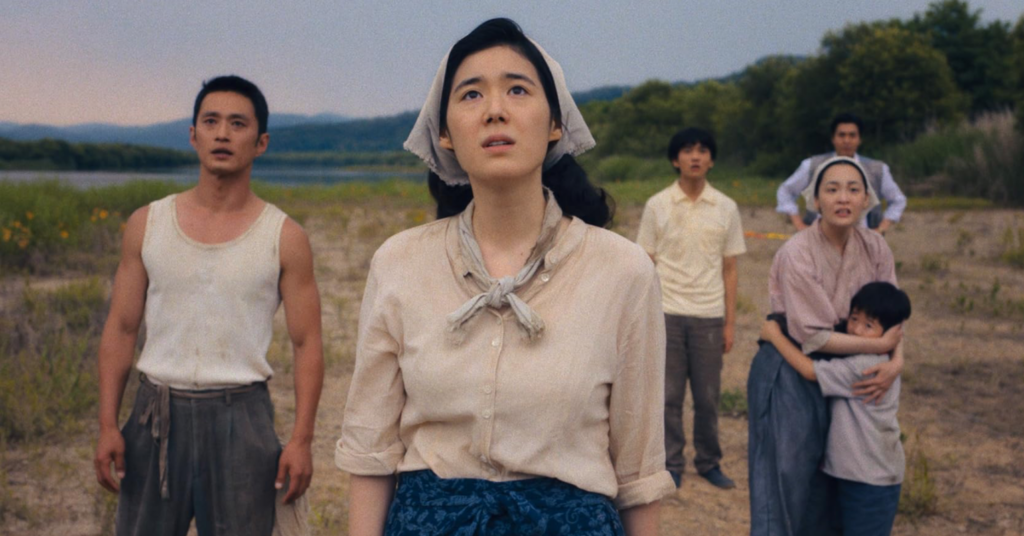*Major spoilers for Pachinko season 2 ahead!
After two years, Pachinko (2022) is back on Apple TV+ with Season 2 alongside previous showrunner Soo Hugh helming the continuation of the historical epic. Since adapting Min Jin Lee’s New York Times best-selling novel Pachinko, the series has garnered critical acclaim — sweeping nominations and fans alike. With high anticipation and expectations for the intergenerational tale, Pachinko’s Season 2 is under pressure to perform as well as its predecessor. And true to Pachinko fashion, it triumphed.
Premiering on August 23 with an episode released every subsequent week, Pachinko Season 2 hones in on the development between the beloved characters. The series stars the same ensemble cast that gripped audiences in Season 1 as family, enemies, and the beings in-between come back with a presence heavier than ever.
With chapters left untouched after Season 1, Season 2 has taken to adapting more content from the original novel with its own televised twist, fueling the beauty and the tragedy of the Baek family. Introducing new talent to the storytelling vision — like directors Leanne Welham, Arvin Chen, and Lee Sang-il — Pachinko delivers a distinct flavor of heart wrench and warmth unexplored before. Taking audiences on another timeless journey, Season 2 is an experience that’s exceptionally immersive — unraveling history with an emotional depth that hits home.
Season 1 Finale Recap
*Warning: Spoilers for Season 1 of Pachinko
What first started out as a common forbidden relationship trope has now fully reared its head into the grim realities of ethnic Koreans living in Imperialist Japan in the 1900s. Pachinko’s Season 1 finale left the story on a tense note. Multiple events foreshadowed the changes that will permanently dismantle the life young Kim Sunja (Kim Min-ha) barely scraped together in Japan with her kind-hearted husband Baek Isak (Noh Sang-hyun).
With rising societal tensions, the two are ripped apart as Sunja helplessly watches the police manhandle Isak away for engaging in activist operations. Shoved into a car after a final, fleeting glance of goodbye, Isak is gone without any indication of whether he’ll ever return. Absolutely devastated after losing her lover and father of her two sons, Sunja has no choice but to push past her grief for her family’s survival.
Persevering in a place far away from home, Sunja takes to selling kimchi — a traditional Korean side dish — in the streets of Japan, surrounded by waves of disgust directed towards her. Barely managing to acquire a spot in the market and outwardly shamed, Sunja braces herself against the clear hatred, resolutely standing for her kimchi and Korean heritage.
In this bewildering transition after her husband’s absence, former lover and prominent cause of her forced emigration to Japan, Koh Hansu (Lee Min-ho) secretly enters back into Sunja’s circle. Unbeknownst to Sunja, Hansu is seen talking with her oldest son, Baek Noa (Park Jae-joon), who doesn’t realize he’s talking to his biological father.
Mirroring this struggle in 1989 is Sunja’s grandson Solomon (Jin Ha), who is fired from his business job for losing a significant deal when he publicly affirms the old Korean landowner’s choice to keep her land in Japan — tanking his company’s buying offer in the process. Losing his American visa and desperate to acquire the land back, Solomon treks a questionable path that he once proudly rejected in the face of his ancestral history to get his career back. With the desperation to survive overcoming all moral judgements in Season 1’s finale, Season 2 launches into whether those efforts to survive ever come into fruition.
Tale Tinged With Time
With flyers fluttering in the wind and raining down the streets of rural Japan warning of imminent American threat in 1945, the taste of war is far too close to home. Kids scamper in the streets with gas masks and sticks posing as weapons, making the light-hearted play that much more melancholic. Even in a town that creaks with the sounds of struggle, women and children gather to practice defending against American invasion, stabbing straw dummies in retaliation and in the name of Japanese imperialism.
While Season 1 left young Sunja empowered to stand strong as a single mother hustling to make ends meet, Season 2 fractures the sacrificial efforts further. Close to financial ruin from supply shortages, Sunja throws away her morals as she ventures into black markets, desperate to put food on the table. As things go unexpectedly wrong and her life is forced to uproot itself and change again, it’s simply painful to watch as Sunja has to destroy every version she knows of herself to simply survive — no longer a daughter in Korea, a proud Korean in Japan, or a loving wife to her husband.
Smiling in an environment of cruelty — if not for herself, then to convince herself to endure for her sons — young Sunja’s tenacity is bitter and driven by the need to survive at the cost of herself. The strength of a mother’s tenacity is not a trope unknown by cinema, but Pachinko really drives it home. While young Sunja’s story takes place in Japan during the 1940s, it was never supposed to end there.
With every piercing glance that older Sunja (Youn Yuh-jung) casts at her family (or even briefly, the camera itself), the hardiness of having endured war and the post-war environment where oppression is more subtle, is starkly apparent. Continuing on with the weaving timelines from Season 1, Pachinko expands on the legacy of mothers, who were victims as much as they were survivors. Attesting to the fact that time can heal but some things never disappear completely, the intergenerational trauma, love, and heroism transcends the century the series covers. Giving the series a timeless note, Pachinko invites audiences of today to reflect on their own histories, identities, and perhaps, even family.
From One Generation to Another
One of the most sought-after narrative arcs from Pachinko readers was about Baek Noa, whose main development Season 2 now covers as he transitions into a young adult. As one of the most insightful characters to the trauma, pressure, and self-imposed responsibilities of the next generation, Noa is undoubtedly the centerpiece of Pachinko’s own coming-of-age story. Portrayed by multiple actors, Season 2 showcases Noa as he grows up and embodies the uncertainty in each environment he had to endure.
As his name Baek is slandered and changed to Bando for school, Noa’s bullies chant his last name out in pure mockery, ensuring his place as the class outcast despite his nice demeanor and scholarly achievements. Dedicated to making his life hell, his bullies sneer at him outside of school in pure antagonism as they successfully shred his social life. As the series finally follows Noa’s transition into adulthood, the trauma of being ridiculed as a Korean follows him. Despite his academic excellence and speaking Japanese fluently, Noa faces an identity crisis — he never belongs, no matter how much he achieves or how prodigious he appears.
Unlike the novel that follows a chronological timeline, the series opts for mixed timelines, often going back and forth between generations. A clever storytelling approach, the interweaving showcases the similarities between timelines, often seamlessly flowing into each other as if the only thing that changed was the setting. Just like Noa, who struggled to fit into Japanese society, his nephew Solomon is struggling all the same, as the effects of colonialism wafts through time. Grasping at the tendrils of an ambitious dream, Solomon desperately tries to compensate for his family’s legacy of hurt through success. But success comes at a cost, challenging yet another generation to rise above struggle.
As Solomon toes the line of Korean and Japanese while also being just generally Asian to his Western colleagues, he hits highs, hits rock bottom, and somehow hits below rock bottom as family — the one tether he trusted — also complicates his morality. In a bitter moment where he lashes out against a worker that mocks older Sunja for her bad Japanese pronunciation, frustration claws at his voice — what more can he do? The answer he arrives at is a common thread in the immigrant narrative: work harder and dig in even more, throw yourself into your work, and establish a work ethic that’s greater than others. But having to prove yourself turns out to be a different kind of monster than forty years ago, with modern business deals and reputation circles built to weed out Koreans and Korean sympathizers.
Even Now, Everlasting
Pachinko is a Japanese pinball game machine that walks a fine line between gaming and gambling. While gambling is illegal in Japan, winning the game gives access to tokens that are then exchanged for other goods. While pachinko is a literal placement in the story with Mozasu’s (Soji Arai/Sohee Park) ownership of a pachinko parlor, there are hints of what pachinko could mean beyond the game. As one of the few employment options available to Koreans, pachinko could reference the thin division between acceptance and unacceptance in Japanese society. In terms of the series, the meaning is up for interpretation — whether the Baek family has truly won the game of life or failed another rigged game of pachinko.
The color-coded subtitles are back again in Season 2, with blue signifying Japanese and yellow signifying Korean and sometimes, a mixture of both in the captions. Coupled with English, the trilingualism is wholly embraced in the series as the narrative presents the realities of ethnic Koreans in Japan and an extension of generations that move beyond.
As Pachinko represents stories that skip generations and decades alike, Season 2 weaves in the stories of the ‘40s and the ‘80s, but the third subtle generation is after another forty-year gap — present day. The series asks us as an audience to educate ourselves on this violent history and to recognize the damage and oppression faced by generations of Zainichi. But beyond the hurt of generations, the series salutes the perseverance and resolve that enabled life to continue. Like author Min Jin Lee has said in the novel, “History has failed us, but no matter.”
Special Series Additions
Touched with a familiar flashy opening credits sequence and an additional cover of Coldplay’s Viva La Vida sung by BLACKPINK’s Rosé, Pachinko Season 2 embraces history in a personalized story that yearns for love and success amid struggle. Without a doubt, Pachinko Season 2 is a series that’s worth tuning into, especially for fans of Season 1.
For more information about Pachinko content, visit the official Apple TV+ Instagram and platform.
Interested in more ACT!ON series content? Read our piece on Chun Woo-hee’s diverse filmography here!




